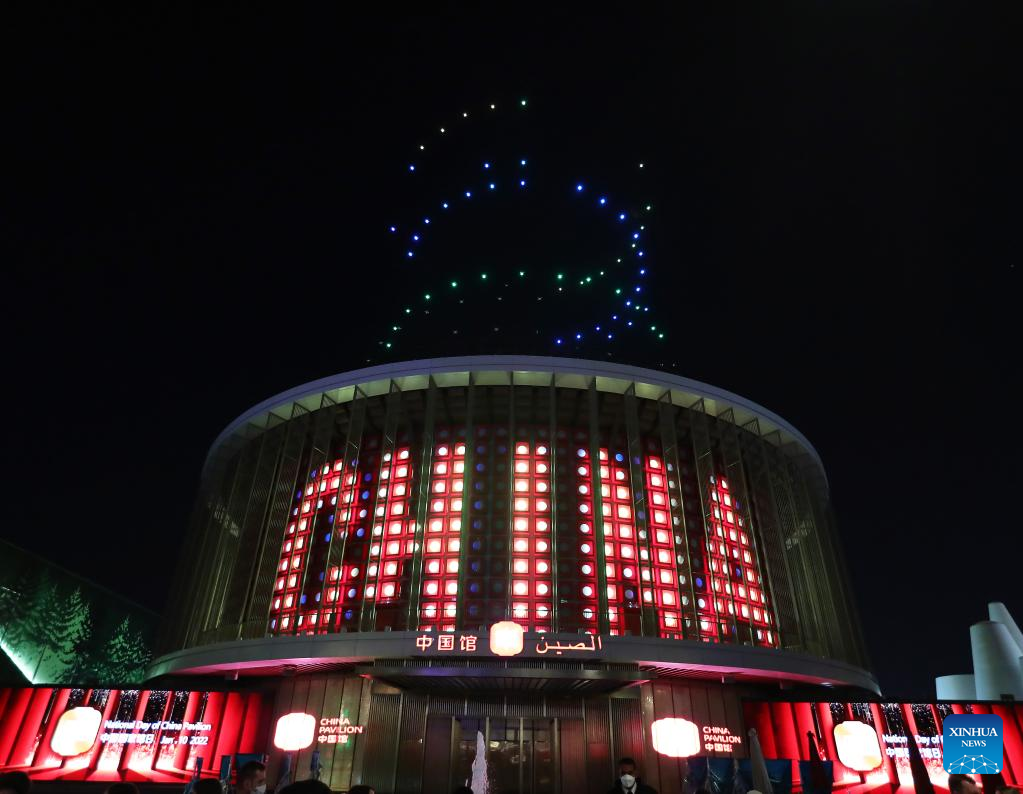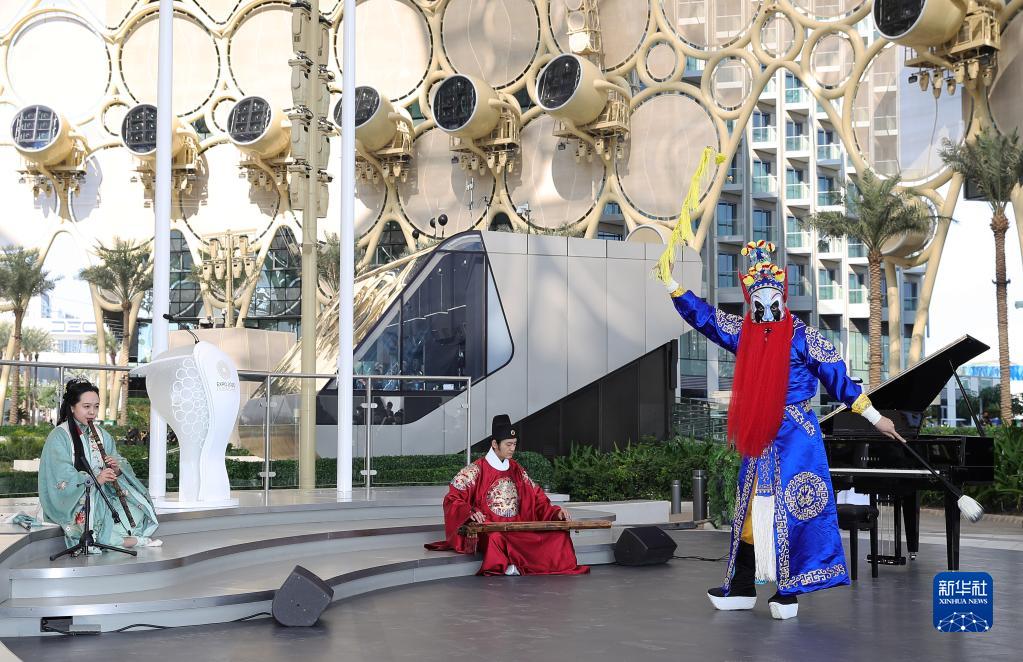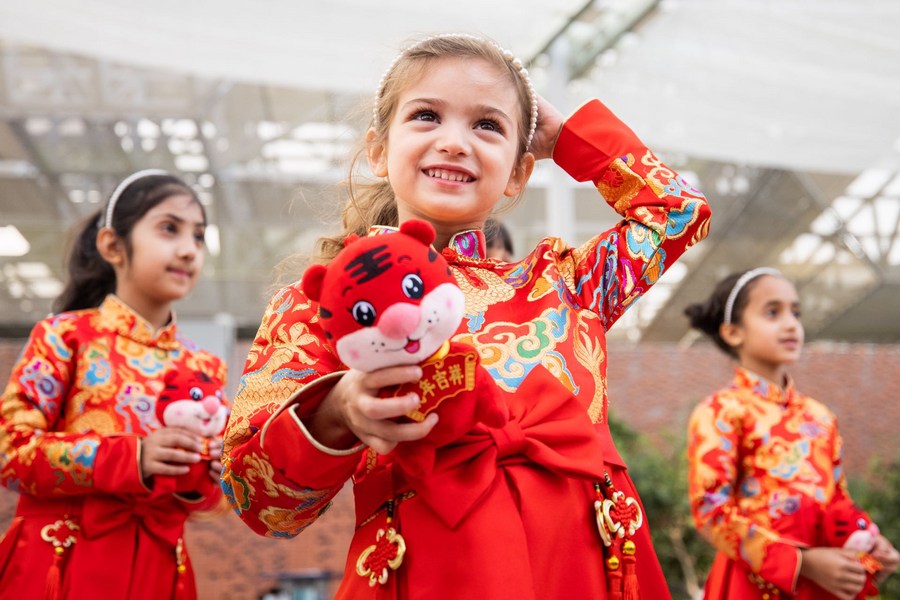For Guangzhou and Dubai, both history and a thirst to seize the future forge a robust relationship

Editor's note: Amity between the people holds the key to sound state-to-state relations. China Daily will come out with a series of stories highlighting Chinese cities' special connections with sister cities, mutual understanding, trust and friendship between peoples of different countries and cultural backgrounds, and shining light on "city diplomacy".
Mohamed Ali considers himself a fortunate man, having seen a lot of the world. Yet one place pulls particularly hard at his heartstrings: Guangzhou in Guangdong province, with its gleaming skyscrapers, thriving commerce, its huge range of culinary delights and its friendly locals.
Ali, a flight attendant with the airline Emirates who has lived in Dubai, the United Arab Emirates, for 12 years, exudes great enthusiasm as he explores Guangzhou, capturing moments in front of a historic white tower, now a popular tourist spot, with his pocket camera.
READ MORE: UAE reaps fruit of Belt and Road
The tower, standing inside Huaisheng Mosque in Yuexiu District, and also known as the Light Tower, tells of the historical link between the civilizations of China and the Arab world that can be traced back to the ancient maritime Silk Road.
Looking up at the tower, Ali says he can see some Arabic styling in it.
"It's amazing, and especially for Arabs, who find it fascinating because of the history it represents."
During the Tang Dynasty (618-907), merchants from the Arabian Peninsula crossed the seas and eventually reached Guangzhou. In those days the tower served as a crucial landmark for them and foreign explorers heading to the Chinese city. For the crews of Arab merchant ships, the tower's conspicuous design told them that they had indeed reached Guangzhou.
Twelve years ago, Guangzhou and Dubai, both important trading hubs at the two ends of the Asian continent, established a tie of friendship that essentially formalized a partnership that had thrived for many years before that.
Ali is one of many people who has been struck by the two cities' similarities.
For diplomats who live in Dubai and Guangzhou, pioneering, inclusive, vibrant and innovative are words often used to describe the two.
Mariam Alshamsi, the UAE's consul-general in Guangzhou, just arrived this spring, saying the city has left her with "an overwhelmingly positive impression".
"I am deeply impressed by the spirit of innovation that permeates Guangzhou, which lives up to its reputation as one of Asia's leading metropolises. The city's dynamic energy reflects that of the UAE, where progress and innovation are integral to our national ethos," Alshamsi says.
"The enduring legacy of the maritime Silk Road does indeed serve as a testament to the historical ties between the Arabian Peninsula and China, particularly Guangzhou. While Guangzhou and the UAE may be geographically distant, their shared attributes underscore the profound connections between us," she says.

Ou Boqian, China's consul-general in Dubai, says: "Historically, Guangzhou and Dubai are important hubs along the ancient maritime Silk Road. Today, both are dedicated to advancing smart cities and fostering high technology."
Both cities exude resilience, openness and inclusiveness, and regard themselves very much as pacesetters, she says.
Indeed, in recent years both cities have stepped up their efforts to adopt new technology, such as electric vehicles and driverless cars, and to develop the use of low-altitude flying vehicles.
In the first nine months of this year, 193,000 vehicles were exported from Nansha Automobile Port in Guangzhou, nearly 40 percent more than in the corresponding period last year. Of these, 32,700 were new energy vehicles, and by the end of the year, 240,000 such vehicles are forecast to have been exported.
Among those loaded from Guangzhou ports are cars made by GAC Group.
"As GAC International's overseas operations expand, the Middle East is our most important sector," says Wayne Wei, president of GAC International.
"Over the past few years, our business has spread to nine countries in the Middle East, including the UAE, Saudi Arabia and Kuwait."

Innovation hub
Speaking of Dubai, he said, "I think it's the most innovative city in the Middle East, and GAC has set up a sales and service center there."
Commenting on the importance of Dubai in the company's business expansion, Wei said: "Dubai is the gateway to the Middle East market. It's a crucial component in our strategy to succeed in the region."
Dubai has bonded zones and provides resources and facilities that can radiate to the surrounding areas, he says.
Wei, who often visits Dubai, also finds a lot in common between the sister cities.
"In a sense, sister cities mean two cities develop hand in hand. I foresee the two cities working more closely deeper in transportation so that we and our partners in Dubai can improve travel and the lives of people in general."
One of the areas both cities are working on promoting is autonomous driving.
Guangzhou started to conduct trial operations of autonomous driving in 2018, and the company WeRide was one of the pioneers. Since then Guangzhou has adopted policies related to autonomous driving, carried out road testing and provided institutional support for the industry to grow.
At an event in Guangzhou on July 5, Han Xu, chief executive of WeRide, hailed the pioneering and innovative spirit of Guangzhou, saying many policy innovations in China's autonomous driving field were first implemented in the city, and that autonomous driving has become a "business card for Guangzhou's new quality productive forces".
The UAE is also at the forefront of technological advances, particularly in transportation.
One of the most ambitious plans is the Dubai Autonomous Transportation Strategy, which aims to transform 25 percent of all transportation in the city to autonomous modes by 2030.
In July last year, WeRide was granted the UAE's first and only national license for self-driving vehicles, enabling it to test and operate its autonomous vehicles on public roads across the country. It now operates the largest driverless taxi fleet in the UAE, with more than 20,000 orders.

Eyes on the skies
While ground-based vehicles are the focal point of most discussions, entrepreneurs in Guangzhou have their sights set on the skies and are working to turn fairy-tale magic carpets into reality.
On April 7, China's Civil Aviation Administration issued the first production certification for a pilotless passenger-carrying aircraft in Guangzhou, which is also the first such license in the global industry of electric vertical takeoff and landing aircraft.
The model for which a certification was granted is the EH216-S of the company Ehang in Guangzhou. It made its maiden flight in the UAE capital Abu Dhabi in May.
Dubai has unveiled plans to introduce flying taxis, with full operations set to begin in 2026, setting the stage for a new era of urban mobility.
"We attended this year's Gitex in Dubai and the booth was a star attraction," said Jack Dong, senior manager of public relations at Ehang. Gitex is said to be the biggest technology show in the world, and this year's edition in Dubai ran over five days from Oct 14.
Flying taxis represent the future, Dong said. "This is the dream. …People in Guangzhou and Dubai are similar in how they embrace new technologies and innovations."
Another Guangzhou company, Xpeng Aeroht, also had its futuristic concept cars, which are still in the development phase, on display at Gitex.
"This model is to demonstrate how we transition from the driving mode to the flying mode," said Fanny Tong, senior manager for international communications at Xpeng Aeroht.
By 2029, the air taxi market is projected to be worth $80.3 billion, compared with $4.9 billion last year, according to Indian market research firm Spherical Insights.
For Ali the flight attendant, riding on a flying taxi between skyscrapers is an exciting prospect. "It will help with the traffic because you'll skip congestion. Then you can see many places in a shorter time. So for tourists coming to Dubai who don't have a lot of time, it will make exploring the city much easier."
The warm ties between the two cities epitomize the robust relationship that China and the UAE enjoy, the fruit of an agreement made on Nov 1, 1984, when they established diplomatic ties.
ALSO READ: Vehicles of tomorrow move step closer to takeoff
"Over the past 40 years, the relationship has been highly fruitful," says Ou, the consul-general in Dubai.
"Both have leveraged their special status as historical trade hubs to explore new areas and achieve remarkable success. Most importantly, both have chosen a development path that suits us well," she says.
"The good internal and external environment ensures our long-term development. We both have visionary leaders and efficient, pragmatic governments. This is among the most important factors in ensuring the long-term economic development of our two countries."
For Alshamsi, the consul-general in Guangzhou, the UAE and China have indeed enjoyed robust bilateral economic ties over the years.
To further strengthen these ties, she thinks there are several key areas such as new energy, financial services and tourism industry, where both nations can deepen existing partnerships.
She believes there is immense potential for collaboration across these various fields, which will "transcend barriers and bring us together for the common good".
Contact the writers at panjie@chinadaily.com.cn


